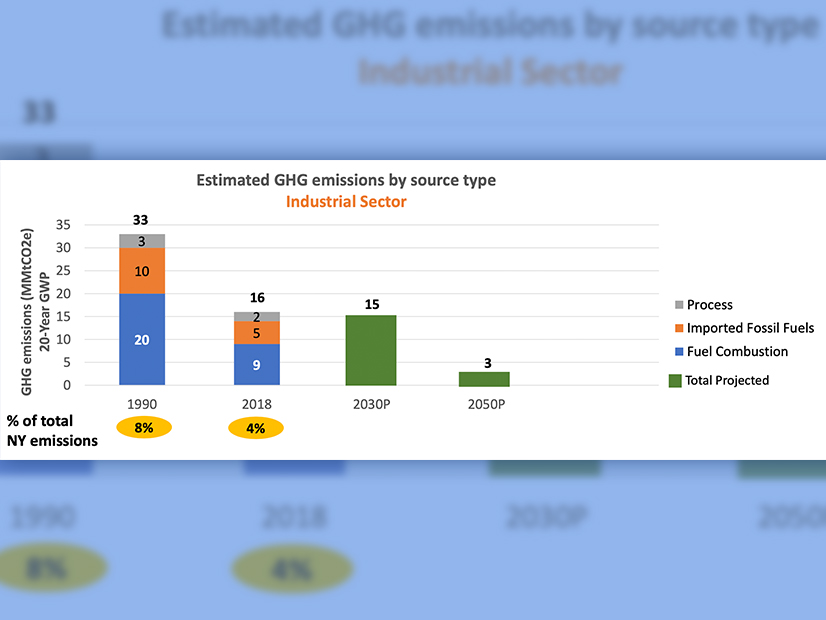New York should provide financial incentives and technical assistance as mitigation strategies to help heavy industries decarbonize, the Energy-intensive and Trade-exposed Industries (EITE) Advisory Panel of the New York State Climate Action Council (CAC) said Monday.
The 22-member CAC heard recommendations from several of its advisory groups as part of its work to complete a scoping plan by fall to help achieve the state’s goals under the Climate Leadership and Community Protection Act (CLCPA).
In addition to its two main strategies, the panel also recommended that the CAC consider a group of enabling initiatives that do not have a direct emissions benefit but would work to support mitigation initiatives. They include training workers for the new green economy and publishing data on industrial greenhouse gas emissions to highlight challenges and track progress.
“Industry will likely experience limited additional emission reductions between 2018 and 2030, and more significant emission reductions from 2030 to 2050 as technologies mature and become more cost-effective for industry,” Empire State Development CEO Eric Gertler said during the EITE presentation.
Gertler, who is head of the panel, said that indirect emissions are the purview of the Power Generation Advisory Panel and are not reflected in the EITE panel’s industrial sector GHG emissions estimates.
“As the state shifts towards clean energy, any emissions associated with industrial electricity should also decline,” Gertler said.
According to the American Council for an Energy-Efficient Economy, several industries in the U.S., including glass, steel, metal casting, pulp and paper, aluminum, and chemicals, employ energy-intensive processes and are exposed to intense global competition.
Costs and Data

Public Service Commission Interim Chair John B. Howard brought up “cryptocurrency mining, all behind the meter, no longer connected to the grid,” and asked if the EITE panel had looked at the issue.
“We have a number of older [power] plants that are retiring that have already been identified as sites for this activity,” Howard said.
“For the most part we focused on reducing emissions from manufacturing and mining but didn’t spend much time on the mining of any of these cryptocurrencies,” Gertler said.
Anne Reynolds, director of the Alliance for Clean Energy, questioned the cost, saying the most effective high emissions impact initiative is the financial incentive. She said she was struck by how much emissions have gone down already from 1990 to 2018.
“I’m wondering if the panel was recommending a continuation of all the financial incentives that New York has already for 2018-2030 to be applied to the reductions forecast between 2030 and 2050?” Reynolds said.
The EITE panel tried to recommend several programs already in existence or ones that are quite efficient and easy to use, Gertler said.
“We’re trying to tread lightly in terms of minimizing costs on industry itself and providing that support directionally to achieve the results that we’re looking for,” he said.
Gavin Donohue, president and CEO of the Independent Power Producers of New York, said most of the energy-intensive work is being done on economic development projects in the state or driven by government.
“We’re talking about rebuilding the Metropolitan Transit Authority, the Port Authority, Penn Station, a lot of projects in New York City that the governor has prioritized,” Donohue said. “I found it very interesting that we can put out mitigation strategies and initiatives and level them against the private sector over and over again. … We can’t just level all these requirements of regulations and obstacles on private sector business.”
He expressed concern over whether the panel has focused on government compliance with the CLCPA.
Raya Salter of NY Renews said that the panel’s heavy reliance on technical assistance to achieve decarbonization will require more information on various industries.
“Do we have the industry with the big ‘I’ to provide that technical assistance?” she asked. “I’m not sure that we do.”
Salter said she is interested in seeing more planning and implementation “on a granular level,” and identifying what the technical assistance would look like, adding that “there are a lot of examples in Europe.”
Attorney Dennis Elsenbeck, head of energy and sustainability at Phillips Lytle, asked the EITE panel to consider economic incentives to help commercialize green energy products developed and produced in New York.
CAC Staff
The CAC on Tuesday announced Sarah Osgood as executive director and Sameer Ranade as climate justice adviser of the Council.
Osgood comes from directing policy implementation at the New York State Department of Public Service and serving as a senior adviser to the chair of the PSC. Ranade recently worked on policy and community organizing at Front and Centered, an environmental and racial justice coalition in Washington State.








